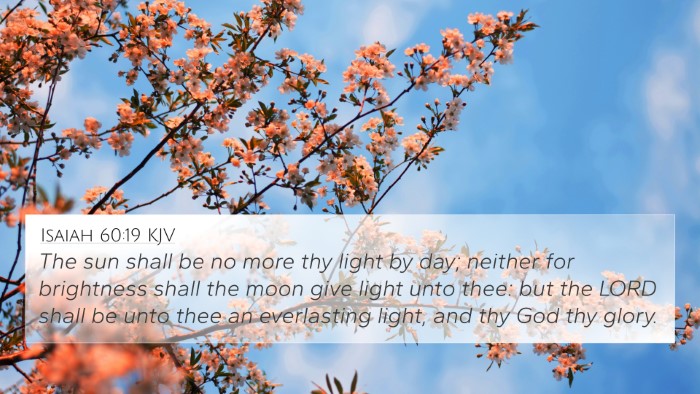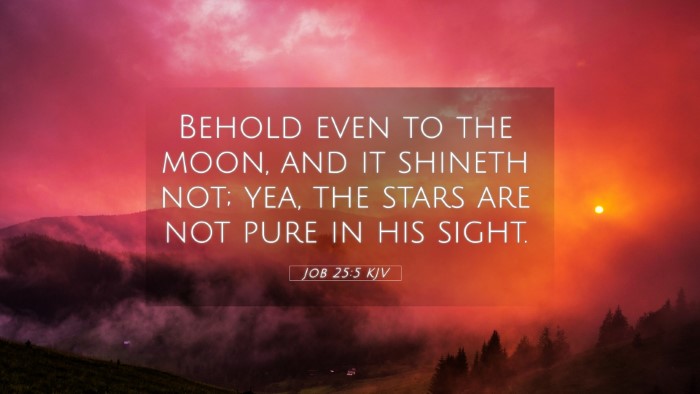Old Testament
Genesis Exodus Leviticus Numbers Deuteronomy Joshua Judges Ruth 1 Samuel 2 Samuel 1 Kings 2 Kings 1 Chronicles 2 Chronicles Ezra Nehemiah Esther Job Psalms Proverbs Ecclesiastes Song of Solomon Isaiah Jeremiah Lamentations Ezekiel Daniel Hosea Joel Amos Obadiah Jonah Micah Nahum Habakkuk Zephaniah Haggai Zechariah MalachiJob 25:5 Similar Verses
Job 25:5 Cross References
Behold even to the moon, and it shineth not; yea, the stars are not pure in his sight.
Uncover the Rich Themes and Topics of This Bible Verse
Listed below are the Bible themes associated with Job 25:5. We invite you to explore each theme to gain deeper insights into the Scriptures.
Job 25:5 Cross Reference Verses
This section features a detailed cross-reference designed to enrich your understanding of the Scriptures. Below, you will find carefully selected verses that echo the themes and teachings related to Job 25:5 KJV. Click on any image to explore detailed analyses of related Bible verses and uncover deeper theological insights.

Isaiah 60:19 (KJV) »
The sun shall be no more thy light by day; neither for brightness shall the moon give light unto thee: but the LORD shall be unto thee an everlasting light, and thy God thy glory.

Job 15:15 (KJV) »
Behold, he putteth no trust in his saints; yea, the heavens are not clean in his sight.

Isaiah 24:23 (KJV) »
Then the moon shall be confounded, and the sun ashamed, when the LORD of hosts shall reign in mount Zion, and in Jerusalem, and before his ancients gloriously.

2 Corinthians 3:10 (KJV) »
For even that which was made glorious had no glory in this respect, by reason of the glory that excelleth.
Job 25:5 Verse Analysis and Similar Verses
Understanding Job 25:5
Job 25:5 states, "If even the moon is not bright and the stars are not pure in his eyes." This verse is a part of a discourse by Bildad the Shuhite, one of Job’s friends, who emphasizes the majesty and incomprehensible nature of God compared to mankind.
Interpretations from Public Domain Commentaries
To fully grasp the meaning of this verse, it's essential to synthesize insights from notable Biblical scholars such as Matthew Henry, Albert Barnes, and Adam Clarke.
- Matthew Henry Commentary:
Henry explains that Bildad highlights God’s authority and greatness by illustrating that even celestial bodies, which seem magnificent to us, are dim in God’s eyes. This reflects the insignificance of man, urging humility in the face of divine power.
- Albert Barnes Notes:
Barnes comments on the comparative nature of this observation, stressing that if the moon and stars, considered radiant, are not pure before God, then humanity, made of dust, must recognize its frail condition. This bears a lesson on the moral purity required to stand before a holy God.
- Adam Clarke's Commentary:
Clarke expounds on the idea that Bildad wants Job to understand that God’s perception of purity extends beyond human understanding. By focusing on the celestial glory that pales in God's judgment, Clarke emphasizes the need for self-examination in one’s spiritual life.
Thematic Connections in Job 25:5
This verse serves as a gateway to broader themes within the Bible regarding God’s sovereignty, human limitation, and the quest for purity. To deepen our understanding, we can explore several cross-referential verses that are thematically linked:
- Psalms 8:4-5: "What is mankind that you are mindful of them, human beings that you care for them?" This verse conveys the concept of human insignificance in contrast to divine glory.
- Isaiah 40:22: "He sits enthroned above the circle of the earth, and its people are like grasshoppers." This verse emphasizes God’s vastness compared to humanity.
- Job 15:14: "What is man, that he could be pure? Or one born of woman, that he could be righteous?" This reinforces Job 25:5's theme of human purity.
- Romans 3:23: "For all have sinned and fall short of the glory of God." This New Testament reference echoes the inadequacy of human purity.
- Matthew 5:48: "Be perfect, therefore, as your heavenly Father is perfect." This verse calls for a divine standard of purity.
- Job 26:14: "And these are but the outer fringe of his works; how faint the whisper we hear of him! Who then can understand the thunder of his power?" This underlines the incomprehensible nature of God.
- Ecclesiastes 7:20: "Indeed, there is no one on earth who is righteous, no one who does what is right and never sins." This reinforces the central theme of Job 25:5 about human fallibility.
Bible Cross-Reference System
Utilizing a Bible cross-reference system can aid in discovering additional connections between this verse and others. Here are some tools and methods:
- Bible Concordance: A valuable resource for locating themes and terms across the scriptures.
- Bible Cross-Reference Guide: Offers structured links between verses that share similar themes or concepts.
- Cross-Reference Bible Study: Engaging in a study method that explores interconnected Bible narratives and themes.
Conclusion
Job 25:5 serves as a poignant reminder of the grandeur of God compared to the frailty of humanity. Through understanding its implications and cross-referencing it with other scriptures, believers can delve into deeper theological reflections on purity, divine judgment, and the majestic authority of God.



